|
|
|
Sort Order |
|
|
|
Items / Page
|
|
|
|
|
|
|
| Srl | Item |
| 1 |
ID:
087826
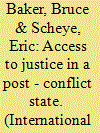

|
|
|
|
|
| Publication |
2009.
|
| Summary/Abstract |
Post-conflict governments and donors prioritize rebuilding the justice sector through state delivered rule of law and access to justice programmes. Misunderstanding the nature of the post-colonial state, such programmes make questionable assumptions. First, that a lack of access to state justice is the same as an overall absence of justice. Second, that the state system that is being built is what people want. Third, that the state system of justice that is being built could provide a sustainable nationwide network in the foreseeable future. Based on interviews conducted with policy designers, practitioners, local people and chiefs at three sites in southern Sudan 2007, this article calls for a rethinking of donor-supported justice and police development and advocates an approach that recognizes the importance of local justice.
|
|
|
|
|
|
|
|
|
|
|
|
|
|
|
|
| 2 |
ID:
175246
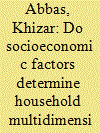

|
|
|
|
|
| Summary/Abstract |
This paper examines the socioeconomic factors of energy poverty at the household level using a dataset of 674,834 households from six South Asian countries. An adjusted multidimensional energy poverty index (MEPI) is used to measure the extent and depth of energy poverty, and a Tobit model is employed to examine the significance of socioeconomic status for multidimensional energy poverty. An ordinary least squares (OLS) regression model is compared with the results of the Tobit model, using the combined dataset and the datasets for each country separately. House size, household wealth, education, occupation (clerical, sales, or agricultural), and gender of the head of the households are significant negative socioeconomic determinants of household multidimensional energy poverty. Place of residence, house ownership status, family size, and the age of the primary breadwinner play a significant positive role in multidimensional energy poverty. These results suggest that effective policy measures for improving the socioeconomic status of households will mitigate multidimensional energy poverty. With implications for the design and implementation of policy, the evidence-based results of this study will contribute to reducing the detrimental impacts of multidimensional energy poverty nationally, regionally, and globally.
|
|
|
|
|
|
|
|
|
|
|
|
|
|
|
|
| 3 |
ID:
101692
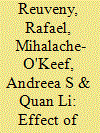

|
|
|
|
|
| Summary/Abstract |
Does warfare affect the environment? This question has received some theoretical and empirical attention, but none of the extant studies has employed large-N statistical models. This article theorizes the possible effects of warfare on the environment and estimates large-N statistical models of these effects on CO2 emissions per capita, NOX emissions per capita, the rate of change in forested area, and a composite indicator of environmental stress reduction. The results indicate that warfare significantly affects the environment, but the signs and sizes of these effects depend on the environmental attribute (whether the fighting is at home or abroad) and development (whether the fighting country is developed or less developed). Warfare reduces CO2 emissions, but the effect is weaker in less developed countries (LDCs) than in developed countries (DCs). Warfare increases deforestation when fought at home and promotes forest growth when fought abroad, particularly in the LDCs. Warfare at home reduces NOX emissions for the LDCs and increases them for the DCs; warfare abroad increases NOX emissions for both the DCs and LDCs. Finally, warfare increases aggregated environmental stress, particularly for the LDCs when fought at home and for the DCs when fought abroad. The sizes of these effects are on par with or larger than the mandated or recommended policy goals stated by the US government for changes in CO 2 and NOX emissions, and by the World Bank (and by implication the DCs driving its policy) for the rate of deforestation, during the coming decade.
|
|
|
|
|
|
|
|
|
|
|
|
|
|
|
|
| 4 |
ID:
101693
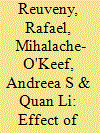

|
|
|
|
|
| Publication |
2010.
|
| Summary/Abstract |
Does warfare affect the environment? This question has received some theoretical and empirical attention, but none of the extant studies has employed large-N statistical models. This article theorizes the possible effects of warfare on the environment and estimates large-N statistical models of these effects on CO2 emissions per capita, NOX emissions per capita, the rate of change in forested area, and a composite indicator of environmental stress reduction. The results indicate that warfare significantly affects the environment, but the signs and sizes of these effects depend on the environmental attribute (whether the fighting is at home or abroad) and development (whether the fighting country is developed or less developed). Warfare reduces CO2 emissions, but the effect is weaker in less developed countries (LDCs) than in developed countries (DCs). Warfare increases deforestation when fought at home and promotes forest growth when fought abroad, particularly in the LDCs. Warfare at home reduces NOX emissions for the LDCs and increases them for the DCs; warfare abroad increases NOX emissions for both the DCs and LDCs. Finally, warfare increases aggregated environmental stress, particularly for the LDCs when fought at home and for the DCs when fought abroad. The sizes of these effects are on par with or larger than the mandated or recommended policy goals stated by the US government for changes in CO 2 and NOX emissions, and by the World Bank (and by implication the DCs driving its policy) for the rate of deforestation, during the coming decade.
|
|
|
|
|
|
|
|
|
|
|
|
|
|
|
|
| 5 |
ID:
137612
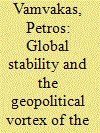

|
|
|
|
|
| Summary/Abstract |
The geopolitical game of the twenty-first century will be multilateral and multidimensional, placing great emphasis on political and commercial interests such as resources, markets, ecology, and finance than on military interests. This essay argues that the eastern Mediterranean as an area of geostrategic importance will continue to be vital to global geopolitics and that consigning it to the back burner is shortsighted. The three continents that meet at this crossroads account for almost 90 percent of the global population as well as over 60 percent of global gross domestic product.
|
|
|
|
|
|
|
|
|
|
|
|
|
|
|
|
| 6 |
ID:
191016
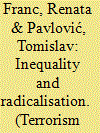

|
|
|
|
|
| Summary/Abstract |
This systematic review sought to synthesize and evaluate the quantitative findings regarding the inequality-radicalization relationship while considering their multidimensionality. The comprehensive search resulted in the screening of more than 5,000 items and the final inclusion of 141 publications. The findings of narrative synthesis suggested that socio-political inequality is more consistently positively related to terrorism/cognitive radicalization than economic inequality, which is more relevant for behavioral radicalization. The findings are discussed in terms of the importance of differentiating between dimensions, indicators, and levels of inequality and radicalization, complex relations, as well as shortcomings of existing evidence base and opportunities for improvement.
|
|
|
|
|
|
|
|
|
|
|
|
|
|
|
|
|
|
|
|
|